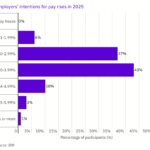Four-fifths of organisations anticipate awarding their employees lower pay increases in 2025 than they did in 2024, according to new research from Incomes Data Research (IDR) http://www.incomesdataresearch.com. This finding is from the company’s latest poll of employers’ pay intentions for the coming year, which received indications on the direction of pay from 136 employers yet to decide their 2025 pay award. Meanwhile, a further 16% of the sample said that the level of pay rise next year is likely to be the same as that awarded in 2024 while just 4% expect that their pay award in 2025 will be higher. These findings hint at an easing of pay pressures and the possibility that pay awards could trend down in 2025, with changes to employers’ National Insurance (NI) contributions likely to influence the level of pay rise awarded.
How much could pay increases be worth in 2025?
The largest proportion of pay awards is likely to be between 3% and 3.99%, with over two-fifths (43%) of employers anticipating that they will award a pay rise at this level. Nearly two-fifths (37%) of participants said that the main pay rise for staff in 2025 is likely to be worth between 2% and 2.99%, while just 14% feel that their pay award will be worth 4% or more. By contrast, in 2024, employees typically received pay rises centred on or around 4.5%, according to IDR’s analysis of pay awards across the economy.
Analysis by sector shows that the largest proportions of employers in both private services and manufacturing (55% and 46% respectively) predict that their pay rises in 2025 will fall between 3% and 3.99%. By contrast, the largest proportions of employers in the not-for-profit and public sectors see the main range for increases lower at between 2% and 2.99% – as predicted by 57% and 50% of respondents from those sectors.
Meanwhile, of those that have already decided their pay award for 2025, some 84% said that the increase they have agreed for this year is lower in comparison to 2024. The remaining proportion (16%) have decided to award the same level of increase in 2025 as they did last year.
Over two-fifths of employees set for pay rise worth 4% or more this year
Separate analysis by IDR of 67 already-agreed pay deals for 2025, as part of the company’s ongoing monitoring of pay rises across the economy, reveals that pay awards are indeed trending down when compared to last year. Within this sample, the median pay award for 2025 is 3.5%, which is lower than that for 2024 when the median for the year as a whole was 4.5%. At the same time, some 45% of pay awards in IDR’s sample of pay deals agreed for 2025 are worth 4% or more.
Changes to National Insurance contributions likely to impact level of pay rise
The poll findings also revealed how employers anticipate responding to the increase in employers’ National Insurance (NI) contributions and the lowering of the earnings threshold for these that takes effect from April 2025. The most common response cited by participants is to award a lower level of pay rise to employees than would otherwise have been the case. Over a third (37%) said that they were ‘extremely’ likely to take this step and a further 32% said this was ‘moderately’ likely. However, just under half (45%) said they are either extremely or moderately likely to absorb the cost of increased employer NI by ‘accepting reduced profits’ while 57% are likely to absorb the cost in some other way (either in addition to, or instead of, accepting reduced profits). This could include increasing prices. While employers are less likely to freeze recruitment or make redundancies as a consequence of the change, around a third nonetheless regard this possibility as either extremely or moderately likely.
Affordability is key influence on pay decisions in 2025
The majority (94%) of the 168 respondents to IDR’s pay intentions poll cited affordability as a key influence on their organisations’ pay decisions for 2025. Inflation was the next most important factor (out of 12 options altogether), with three-fifths of respondents indicating this as an influence – down from 69% at the end of 2023.
“Inflation is currently lower than it was a year ago and this has reduced the upward pressure on pay to some extent. However, the findings from our poll show that inflation continues to figure relatively highly in employers’ concerns even as it has come down, in part because the cost of living itself remains high,” commented Zoe Woolacott from IDR.
The post Employers anticipate lower pay rises in 2025 with employer NI rises likely to have an impact first appeared on HR News.




